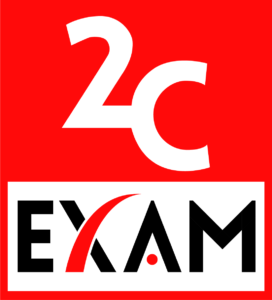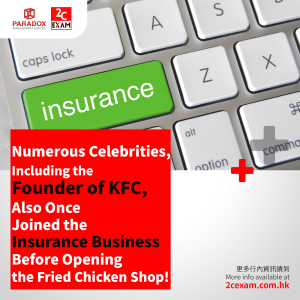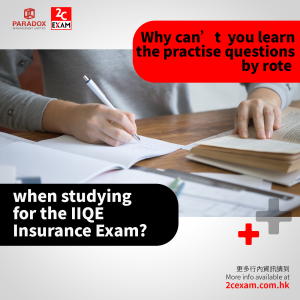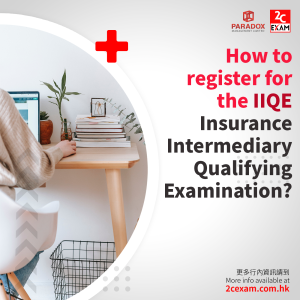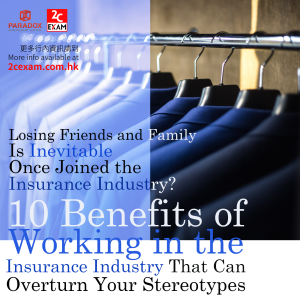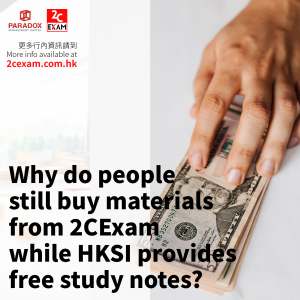Many people think that the exam coverage of the IIQE insurance exam is broad. The following are 10 small tips to improve the efficiency of revision and enhance the understanding of concepts!
Improve Study Efficiency
- Set goals during revision. You don’t need to go through too many contents at a time, but you need to break down the scope into smaller parts. Not just help managing time, it can also increase candidates’ sense of success and gain more confidence in taking the exam.

- Practicing mock exam questions is absolutely beneficial for revision! Usually, the champions of public examinations such as the Hong Kong Certificate of Education Examination (HKCEE) and Hong Kong Diploma of Secondary Education Examination (HKDSE) definitely practise past papers. This is because inputting concepts (absorption of concepts) does not necessarily mean having the ability to output them (application of concepts). Let’s say, you know a lot of English words but sometimes they just slip your mind when you need to use them. The purpose of doing more mock exams is not to expect the same question to appear again in the exam, but to distinguish the way that the exam question editor thinks so you understand what answers should be selected in the real exam. With more practice, you can come into contact with many different question types, master the skills of choosing the most suitable answer (not necessarily the only correct one), and improve your exam performance. In addition, the allocation of time for answering questions will be grasped more quickly. Especially for calculation questions, to evaluate whether you understand the recited formulas or not, you must actually substitute the scenario-based questions and calculate at least once by yourself.
- Make sure you understand the concept before moving on. You can master the knowledge and apply it quickly in the exam only when you understand the relations, principles, cause and effect, and the underlying meaning. Don’t be afraid to spend time comparing different and similar concepts graphically or understanding the causal relationship behind them. Do it! Because the memory of the systematized content can be much longer-lasting than the rote learning memory, it can be more easily retrieved.
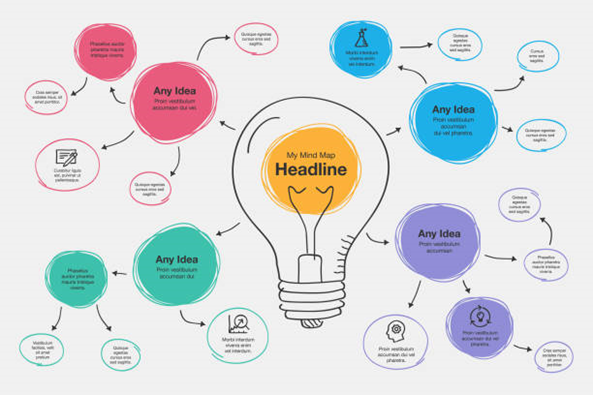
- Don’t waste too much time on difficult exam questions. Many candidates lose a lot of points in their actual exams because they don’t want to waste every scoring opportunity so they waste a lot of time on the same question, or even use up time that is supposedly for the later questions. However, in this exam, the scores for each question are equal, so if you encounter a question you find it hard, choose a random answer, bookmark the question and then go back only after finishing the whole paper. With some luck, you may even find hints between the lines of other questions.

Question Answering Skills
- Look out for words with high certainties, such as “all”, “none”, “all”, “none”, “eliminate”, “exempt”, “only”, “solely”, “exclusive”, “wholly”, “merely”, “impossible”, “never”, etc. There are exceptions to many situations in the world, so many times there is no “only” or “all”
- Use the substitution method. If students feel confused when taking the exam, they can substitute technical words into everyday examples. For example, if the question asks if COVID-19 is an insurable risk, you can substitute some news or cases you heard in your daily life. For example, by common sense, you know that COVID is physical harm to humans. Some insurance companies may claim that COVID-19 is covered by their policies and some may not, therefore, COVID-19 can be insurable if the policy specifies the coverage of such.

- Fit your shoes in the perspective of the regulator. For example, regulators in Hong Kong do not really care whether your company is making money or losing money, or whether your company’s fees are the second cheapest or the fourth cheapest in the industry. Instead, they will pay attention to both the internal and external documents, regulations, and conflicts of interest.
- Excluded Perils and Uninsured Perils are two different things. Excluded perils refer to the scope stated in the exemption section of the policy or not covered by the law, generally including large disasters such as wars and plagues, also can include other specified events. Let me give you an example, usually in many life insurances, suicides during a certain period of time from the date the life insurances becomes effective are not covered. If the insured who purchases life insurance a month ago commits suicide, they will not get compensation from the life insurance. Uninsured perils mean risks that the insurance company neither does not state in the policy coverage, nor does the policy state that it will not be covered. However, uninsured perils are not 100% uninsurable because losses directly induced by insured perils are covered. For example, buying fire insurance generally does not compensate for losses from theft, accidents or intentional breaking of windows by foreign objects. However, if the window is broken (caused by the need to put out a fire (a covered peril), then the loss of the window can be covered.
- An agency relationship does not necessarily require contractual confirmation and does not equal to an employment relationship. In the insurance industry, both insurance agents and insurance brokers act as agents and are not employer-employee relationships. Once the principal authorizes an agent to conduct transactions on its behalf, the principal is responsible for the agent’s actions. For example, if a store clerk makes a misleading or false statement causing the customer to buy the wrong product, the blame cannot just be passed on to the employees since the store needs to take responsibility for employees’ representation. The store may need to compensate or take remedies for the customer’s loss. However, the principal may also seek compensation from the agent through other channels.
- Human life is priceless, so indemnity cannot be applied to the death benefit of a life insurance policy. Therefore, no matter how many life insurance policies a person buys, as long as it is not an excluded peril, the insurance company needs to compensate for the insured’s life loss. For example, if a person buys 10 life insurance policies with a sum insured of 1 million dollars each policy, the beneficiary WILL RECEIVE 10 million dollars in compensation if the policy does not expire at the time the insured dies, instead of 10 insurance companies each paying 100,000 dollars to make up 1 million dollars.
How can we help?
2CExam provides HKSI LE, IIQE, EAQE and SQE related exam preparation materials. We sell mock question banks for IIQE Papers 1, 2, 3, 5 and MPFE in Chinese and English; and bibles for IIQE Papers 1, 2, 3, MPFE in Chinese. We also offer 1 on 1 tutorial services. Besides, we have also made free tutorial videos for IIQE Papers 1, 2, 3 and MPFE and posted on public channels such as Youtube/ Bilibili/ Tencent/ Iqiyi. 2CExam has been an exam training expert for years. Should you need any help please visit www.2cexam.com.hk or contact us through:
Phone +852 2110 9644 Email: [email protected]
Wechat: hk2cexam WhatsApp: +852 9347 2064
Please support us by leaving comments and likes if you think this article helps you!
You can scan or click on the QR codes to visit our social media.
Latest Article
Categories
過往文章
Contact US
-
Phone:
+852 2110 9644
-
Email:
-
WhatsApp
+852 9347 2064
-
WeChat
hk2cexam
Interesting Articles
Which license is required for bank employees engaged in securities business?
Should Hong Kong bank employees apply for an HKMA license or an SFC license? According to the licensing requirements for real estate practitioners, passing relevant qualification exams is a necessary condition for obtaining a real estate agent (individual) license or a salesperson license. The Hong Kong Securities and Futures Practitioners Qualification Exam (HKSI LE) is…
What is the difference between an SFC license and HKMA registration in Hong Kong?
What is the difference between an SFC license and HKMA registration in Hong Kong? In Hong Kong, the statutory organization responsible for regulating the securities and futures markets is the Securities and Futures Commission (SFC). The Securities and Futures Ordinance, which came into effect on April 1, 2003, grants the SFC regulatory authority over the…
What is an HKSI certificate?
What is an HKSI certificate? What is the use of an HKSI exam transcript? What is an HKSI certificate? Do I need an HKSI exam transcript or an HKSI certificate when applying for SFC registration? To work in the securities industry in Hong Kong, passing the Hong Kong Securities and Futures Commission (SFC) Licensing Exam…
How to obtain an exemption for the HKSI LE Securities and Futures Practitioners Qualification Examination?
How to obtain an exemption for the HKSI LE Securities and Futures Practitioners Qualification Examination? In the previous issue, we talked about how if someone wants to work in the securities industry in Hong Kong, they must first pass the Hong Kong Securities and Investment Institute’s (HKSI) Licensing Examination for Securities and Futures Intermediaries. Are…
Where can I register for securities exams in Hong Kong?
Where can I register for securities exams in Hong Kong? If you want to work in the securities industry in Hong Kong, you must pass the Securities and Futures Commission (SFC) Licensing Exam LE. The organization that conducts the Licensing Exam LE in Hong Kong is the Hong Kong Securities and Investment Institute (HKSI). The Hong…
Often hear the beautiful ladies and handsome gentlemen in the Hong Kong financial sector talking about the “178 license” they need to obtain. What exactly is it?
What is the Hong Kong 178 license? In fact, the 178 license is not a real license but refers to a combination of examination papers that need to be taken. It consists of the Hong Kong Securities and Futures Practitioners Qualification Examination Paper 1, Paper 7, and Paper 8. In Hong Kong, activities related to…
What is the SFC license in Hong Kong?
What is the SFC license in Hong Kong? The Securities and Futures Commission (SFC) of Hong Kong was established in 1989 as an independent statutory body responsible for regulating the securities and futures markets in Hong Kong. The Securities and Futures Ordinance and its subsidiary legislation grant the SFC the power to investigate, correct, and…
Why do people still buy materials from 2CExam while HKSI provides free study notes?
In addition to organizing LE exams, the HKSI will also provide students who take the LE exam with the exam coverage called the Study Note. It depicts what is covered in the exam with hundreds of pages and full of paragraphs. It is lengthy and contains a lot of data and examples that will not…
EAQE/ SQE Real Estate Agency Exam Coverage/ Scope for Revision
Many students are clueless about the exam coverage / scope for doing revision on the Estate Agent Qualifying Examination (EAQE) and Salesperson Qualifying Examination (SQE). VTC’s PEAK does not have any notes available for candidates to download. In fact, the scope of the exam is quite extensive. Some of the coverage can be downloaded from…
Is success an Unattainable Ideal in the Real Estate Industry? 10 Benefits of Being in the Real Estate Industry Can Stimulate Your Capacity
Is it difficult to succeed in the real estate industry? Living space is one of the indispensable elements in life. From the wealthy speculating and selling flats to ordinary people looking for a place to live, most Hong Kong people have the demand to rent or even invest in the real estate market. Hong Kong’s…
